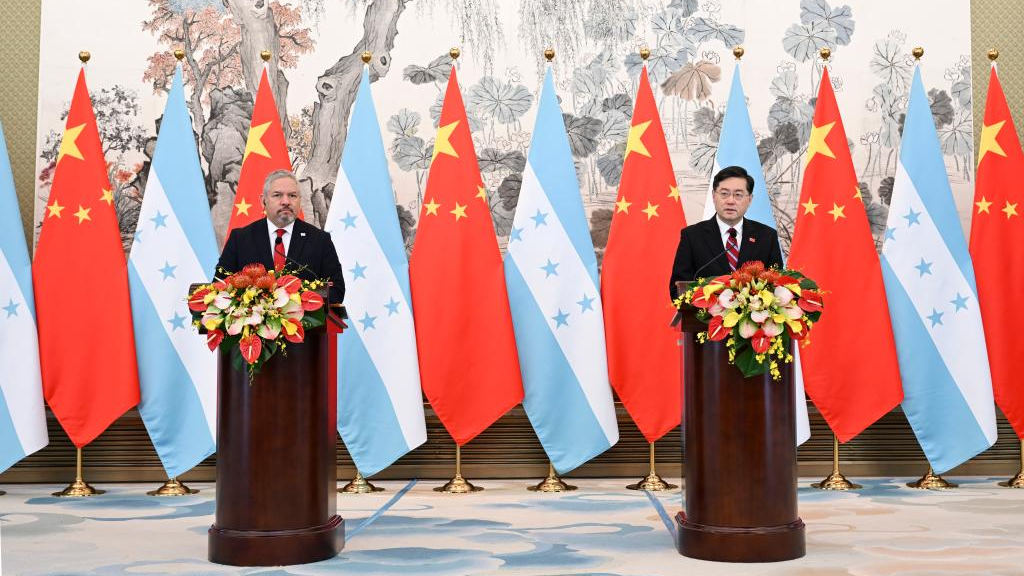Published: March 28,2023
By Mustafa Hyder Sayed

Chinese State Councilor and Foreign Minister Qin Gang (R) and Honduran Foreign Minister Eduardo Reina (L) attend a joint press conference in Beijing, capital of China, March 26, 2023. /Xinhua
The establishment of diplomatic ties between Honduras and the People’s Republic of China on March 26 signifies the second diplomatic victory for China, after successfully forging a historic rapprochement between Iran and Saudi Arabia. After the recent successful conclusion of the two sessions, China’s international diplomacy has witnessed more prowess and result-oriented endeavors. From the Middle East to Latin America, there is a growing sense of confidence in the peaceful rise of China, and confidence in China by these countries as a reliable and trusted partner.
There are at least three reasons why countries like Saudi Arabia that had a long-standing “oil for security” pact with the United States, and Honduras, that had a long-standing relationship with China’s Taiwan region, are moving away from traditional alliances and choosing China. China doesn’t strong-arm and coerce partners to follow “their policy or else.”
When President Joe Biden asked Saudi Arabia to adjust the oil prices as per the wishes and interests of the United States, Saudi Crown Prince and Prime Minister Mohammed bin Salman Al Saud refused to be strong-armed. Therefore, the inclusive, multilateral prism of China which is a shift from the U.S.-curated prism of “zero-sum” is more appealing to these countries.
Besides, China’s international public goods such as the Belt and Road Initiative (BRI) are based on economic connectivity and development, and investment from Chinese companies is not linked to political preconditions, which is often the case with economic partnerships with the U.S. or U.S.-backed institutions. China’s investment is a lucrative opportunity for countries like Honduras which has already received $300 million investment in a dam project, as well as for Saudi Arabia, that will be exporting oil to China on a special, long-term contract.
These new partners of China see it as an “above-board” player that has followed the policy of non-interference, as opposed to regime-change, which the U.S. has done time and again. In Honduras, as reported by the New York Times, trained individuals like Florencio Caballero headed CIA-backed death squads to illegally persecute leftists, similar to which the U.S. also did in Chile and Argentina.
Roatan Island of Honduras. /VCG
Gaining a better understanding of the current and historic situation, Honduras is now the ninth country to have broken diplomatic ties with China’s Taiwan since Tsai Ing-wen came to power there. With the establishment of the new Honduras-China diplomatic relationship, there is much to be learned and expected.
It shows that Beijing’s one-China principle is supported by almost all countries of the world, and China’s moral ground on its territorial integrity is acknowledged by the international comity of nations, even though Washington has made every effort to make Taiwan’s status as part of China controversial.
Facing Honduras’ new step, the Taiwan region has increasingly limited options, and must realize that reunification with Chinese mainland is in the interest of the people of Taiwan, whereas confrontation with Chinese mainland, will only be at the detriment of people and stability of Taiwan. Even the closest allies of the U.S., like Saudi Arabia, are now rethinking their relationship with the U.S., because they see U.S. as lacking consistency and following through with their commitments, such as not protecting Saudi Arabia from missiles launched from Houthi rebels. Taiwan region must reassess objectively, detached from emotion, the support of Washington.
The new ties between this important Latin American country and China also shows a reset of international relations in the post-pandemic world order, where countries are turning a new chapter that prioritizes economic development and people’s development over military and security cooperation. The Chinese model of development is increasingly resonant with these countries that aspire the same poverty alleviation and economic growth that China, as a developing country, has attained.
The message from Honduras is clear that the international community, from Asia to Latin America, does not have an appetite for a new Cold War. The United States must realize that it can no longer sell “war” and “containment.” There are no takers for those. It can try to sell economic development and connectivity, and then it will perhaps have a better chance of remaining a relevant player.
Mustafa Hyder Sayed is the executive director of the Pakistan-China Institute.
 Africa -China Review Africa -China Cooperation and Transformation
Africa -China Review Africa -China Cooperation and Transformation
